Best Mini-ITX Cases 2025: Our Tested Picks for Compact PC Builds
You can assemble a compact, powerful, good-looking system with one of the best Mini-ITX PC cases we've tested.
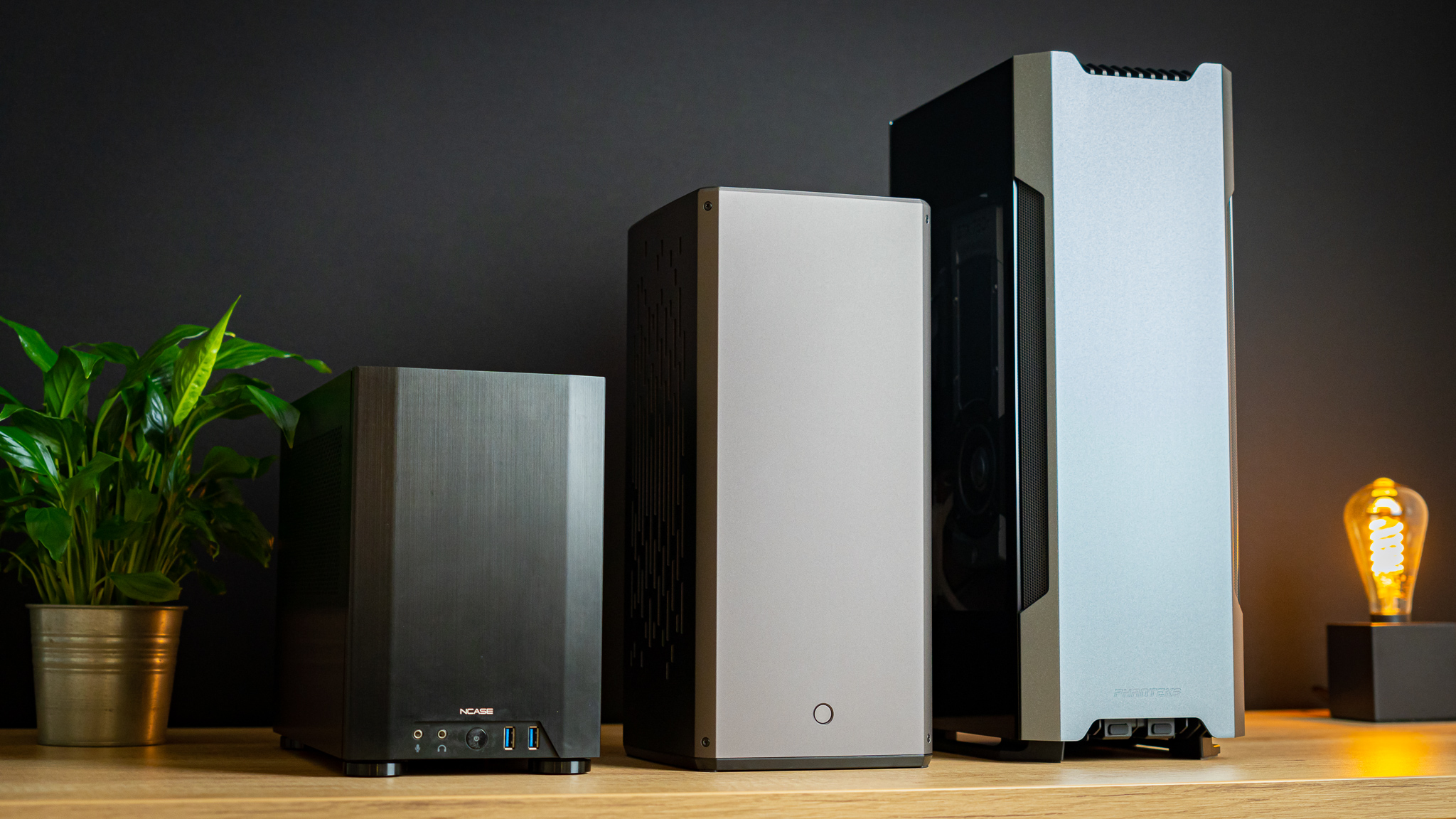
Amazingly, the 6.7 × 6.7-inch Mini-ITX motherboard form factor, which debuted in 2001, has been around for nearly a quarter century. But while lots of other tech has continued to shrink in the last couple of decades, many builders and enthusiasts are still building PCs in big towers with full-size ATX motherboards. But that really isn’t necessary for most builders today, even if you're assembling a cutting-edge high-performance rig with a huge, heat-generating RTX 5090 or a Radeon RX 9070 XT).
For years, opting for Mini-ITX meant trading performance for a smaller PC, requiring short, compact graphics cards and low-profile coolers. Choosing a small-form-factor (SFF) SFX power supply is still often a requirement in the smallest cases, but most ITX cases released in the last few years also support full-length two- or three-slot graphics cards. And Nvidia is at least making a small effort to keep compact, high-performance card options around with its SFF-ready guidelines.
Still, GPUs have on gotten larger in the past few years, abd the 5090 Founders Edition notwithstanding, third-party SKUs of 50-series cards are at least as large as their previous-gen counterparts. So be sure to check clearances before buying a case to fit your GPU (or a GPU to fit your case).
And, obviously, don't neglect cooling. Shoving high-end parts into a compact case without ample ventilation and fans will lead to throttling at best, and perhaps a shorter lifespan for your parts.
Below are our favorite tested picks for the best Mini-ITX cases you can buy today.
The Best Mini-ITX Cases You Can Buy Today
Why you can trust Tom's Hardware
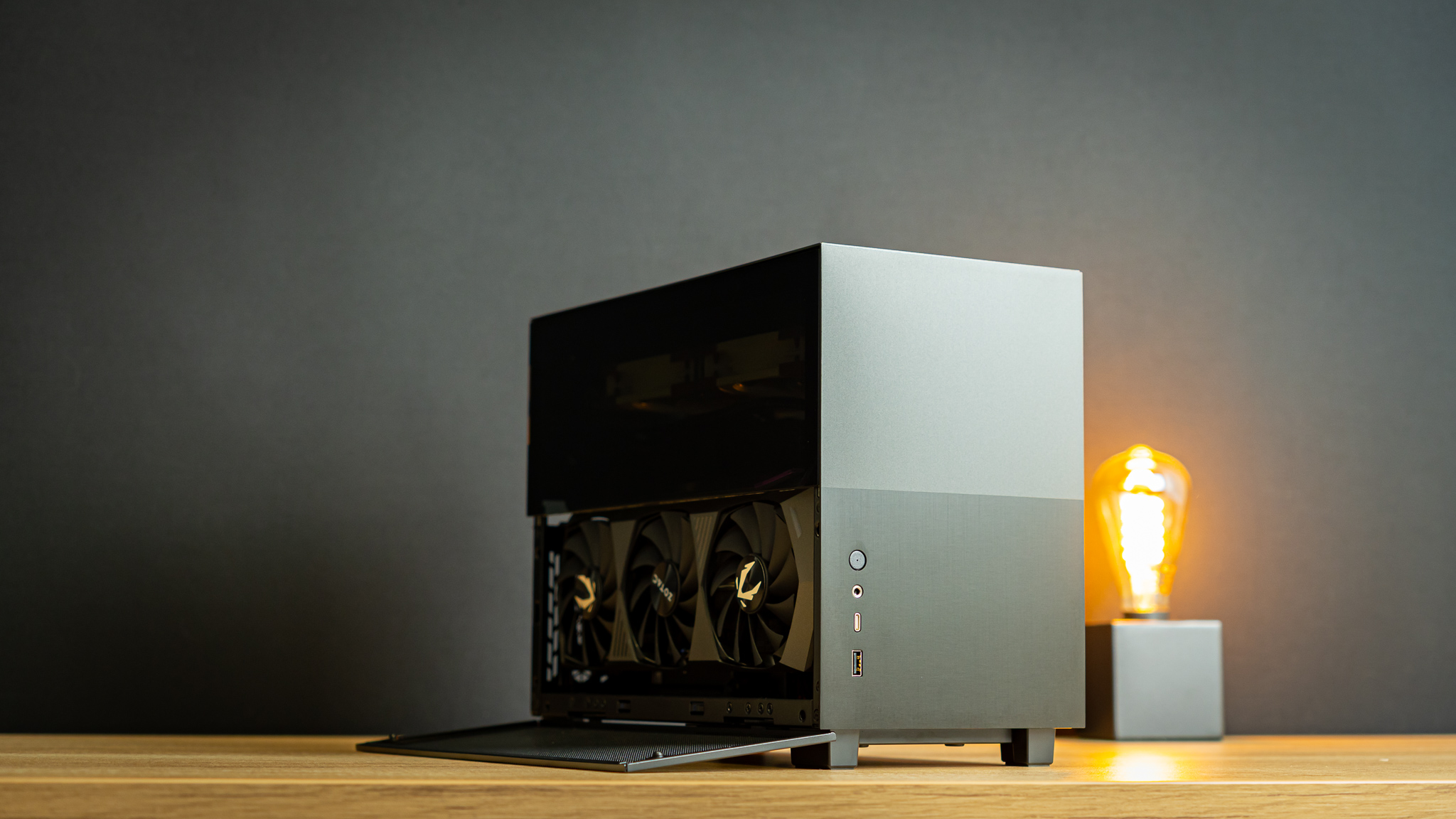
1. Lian Li Q58
Our expert review:
Specifications
Reasons to buy
Reasons to avoid
Lian Li’s Q58 blew us away, making it an easy pick as the best Mini-ITX case for most people. This is a 14.3-liter Mini-ITX case that costs just $130 in its base variant, and it packs great looks, excellent cooling potential, and a flexible internal design.
The basic frame is made from steel, and each side houses half-glass, half-perforated steel panels. The front and the top plate are made from fancier aluminum, altogether giving the case a very premium look and feel. The GPU can draw fresh air straight from the side, but you can still see its pretty RGB through the glass, and you can squeeze a 280mm radiator in the case’s roof.
But, the case can be reconfigured to sacrifice some AIO and storage options in favor of fitting an ATX power supply, which is a great way of achieving some cost savings, in combination with opting for the plain PCIe 3.0 riser cable. Throw another $30 in, and you’ll get a PCIe 4.0 riser cable, ready for RTX 3000 and RX 6000 graphics cards. There are few things not to like about the Q58.
Read: Lian Li Q58 Review
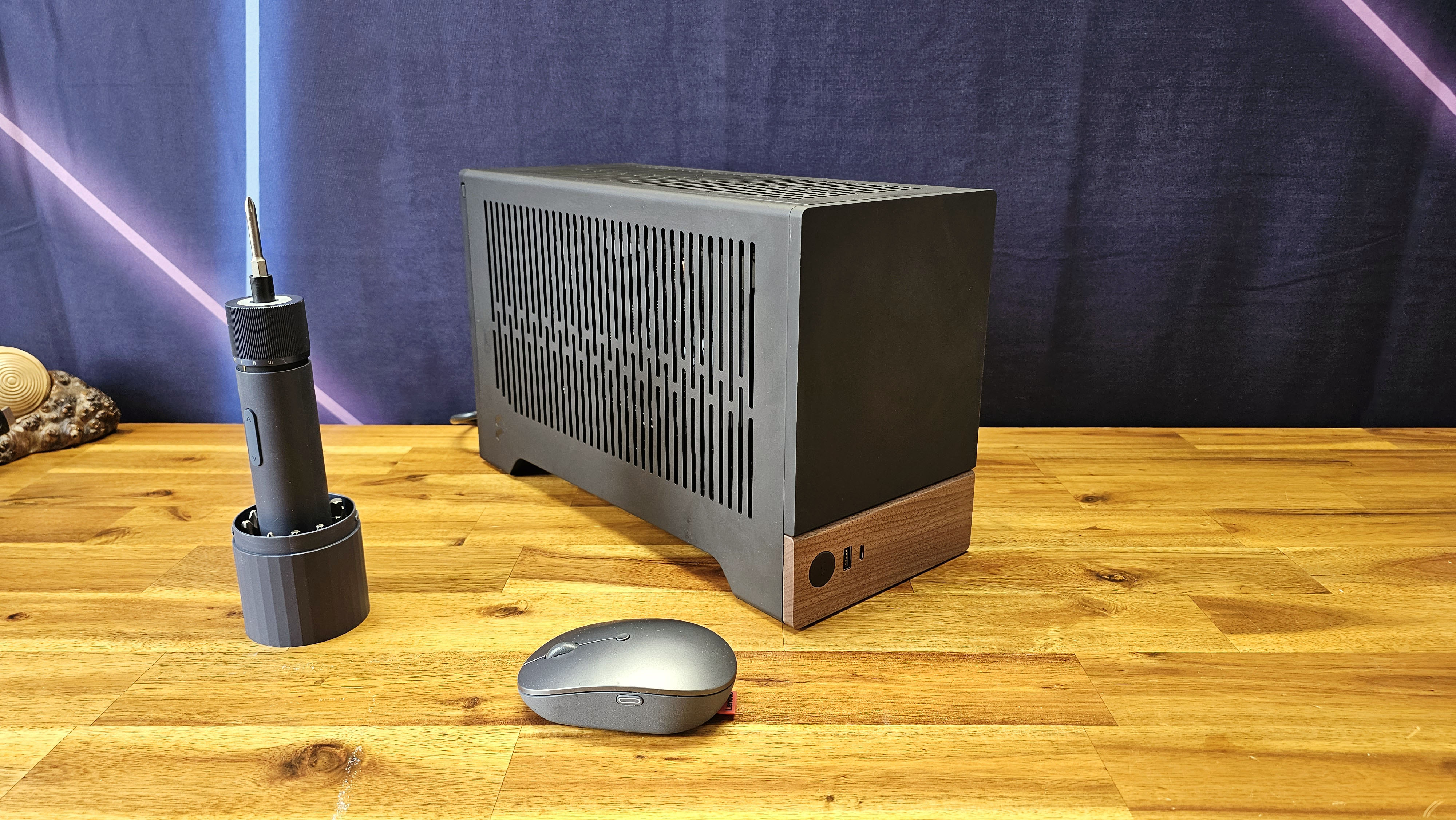
2. Fractal Design Terra
Our expert review:
Specifications
Reasons to buy
Reasons to avoid
The smallest PC cases from before the likes of the RTX 4090 and modern high-end CPUs are now basically obsolete because they can't handle huge graphics cards and the demanding thermals of modern components. But the Mini-ITX Fractal Design Terra case has (just) enough room for (most) big graphics cards, and is prettier than other cases thanks to an aluminum outer shell and some striking wood trim up front. Like the larger Fractal North tower, this case is a welcome departure from the aggressive lines and RGB of most gaming-focused cases.
The Terra's flip-up doors and adjustable spine also make this case fairly easy to build in considering its tiny size. Just make sure o pick up a modular SFX power supply. You'll need all the extra space you can get in this case.
Read: Fractal Design Terra Hands-On
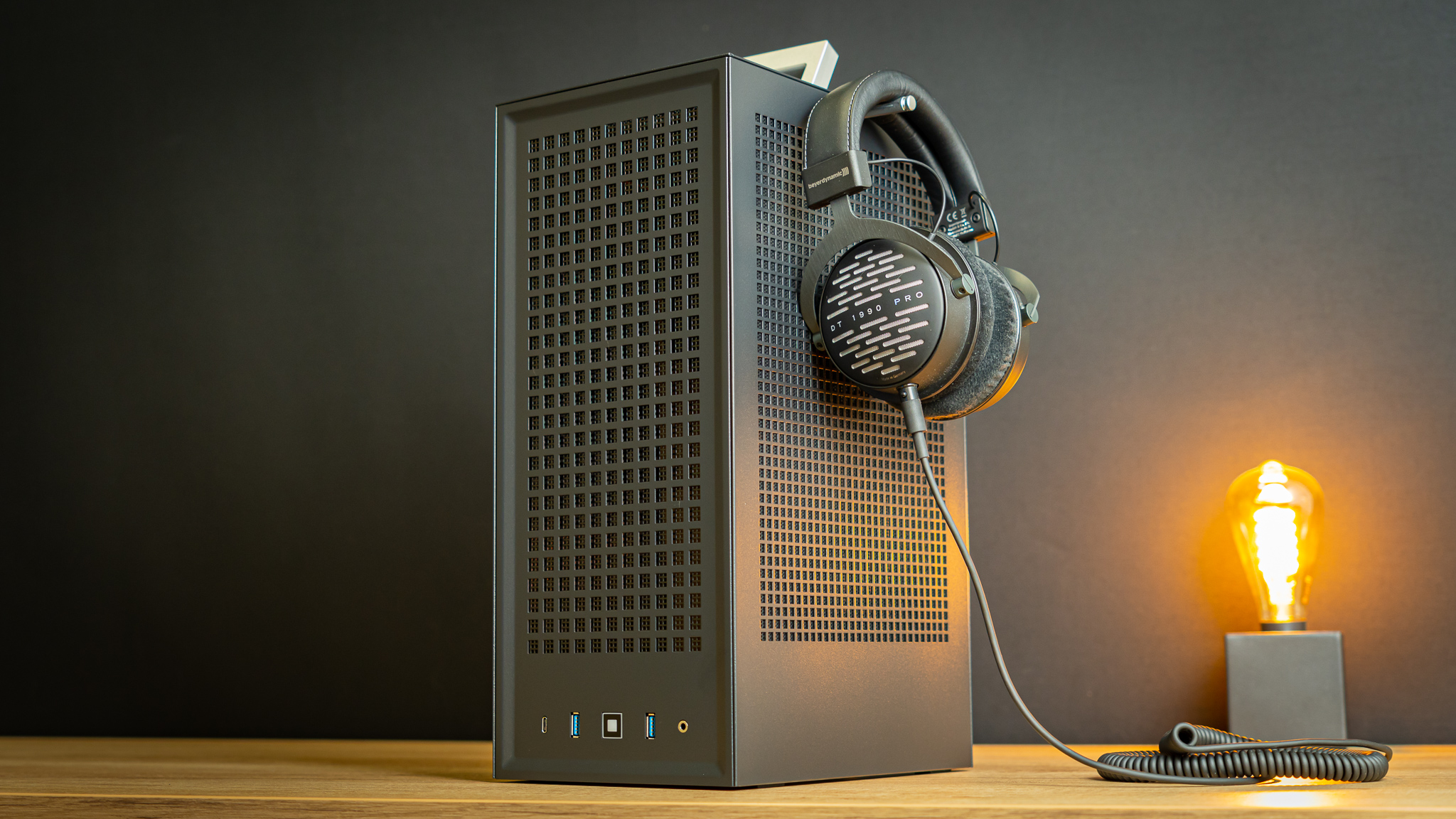
3. Hyte Revolt 3
Our expert review:
Specifications
Reasons to buy
Reasons to avoid
When iBuyPower said that it would be opening the Revolt 3’s chassis for purchase as a standalone chassis, we were excited. And now that it’s here, we’re quite impressed. The Hyte Revolt 3 is a compact ITX case that doesn’t cost much at $129, but offers a wonderfully practical design with plenty of mesh, two click-away headphone holders and a carrying handle that sits flush into the top when you don’t need it. Of course, the build quality isn’t quite top-notch at this price. It’s all just painted steel, but the paint finish is nice and with its sleek, tidy looks, will fit in well in almost any gaming setup.
Internally, the Revolt 3 can also house almost any Mini-ITX system you throw at it, with room for large GPUs, up to a 280mm AIO, two 2.5-inch SSDs and one 3.5-inch drive. Better yet, its layout meanst it doesn't need a PCI-e riser cable, so you won’t have to worry about reduced bandwidth on an RTX 3000 or RX 6000 series graphics card.
The only real catch to this chassis is that it relies entirely on the AIO for airflow. But in testing, we found that this setup is perfectly adequate, even when we threw our high-TDP i5-11600K and RTX 3080 Ti graphics card at it.
Read: Hyte Revolt 3 Review
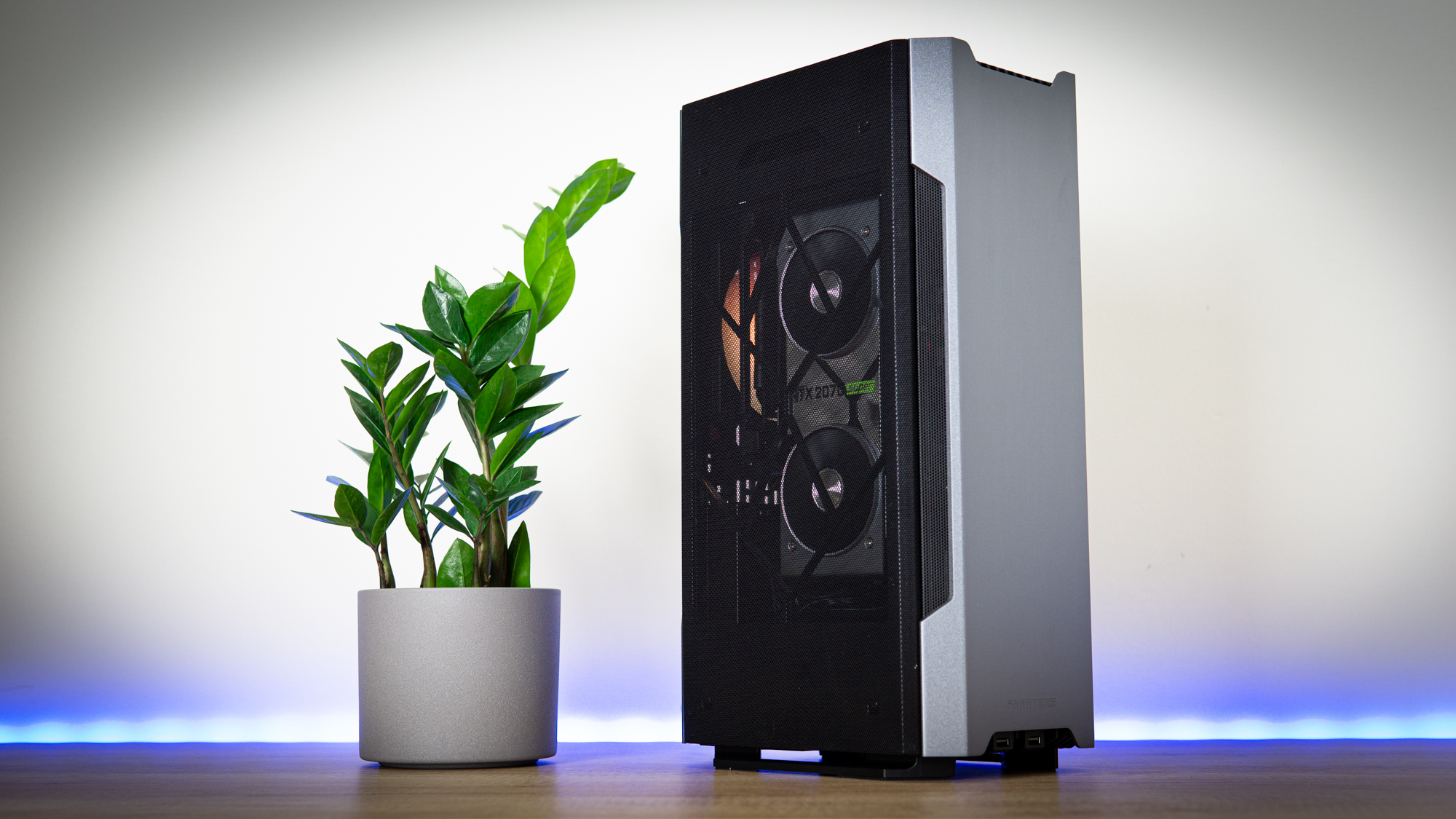
4. Phanteks Evolv Shift 2
Our expert review:
Specifications
Reasons to buy
Reasons to avoid
The Evolv Shift 2 stands out at first glance for its towering, small footprint design and beautiful anodized aluminum panels. Priced at $100 for the mesh version and $110 for the variant with TG and an addressable-RGB fan, it easily earns a spot on our Best Mini-ITX PC Cases list.
With a small footprint and beautiful finish in both the tempered-glass and mesh variants, the Evolv Shift 2 is perfect as an SFF PC for use in the living room, or moving around the house wherever you need it. The easily accessible top IO makes plugging devices in a breeze too. Building in it was tight, and came with the typical frustrations associated with Mini-ITX systems, but I still managed a build within about 3 hours, and the end result was well worth the effort. The overall size is a bit bigger than most Mini-ITX cases would be, but the tempered glass side panels do wonders for creating systems to show off, though keep in mind that its single-fan radiator support may be too thermally limiting for some systems.
Read: Evolv Shift 2 Review
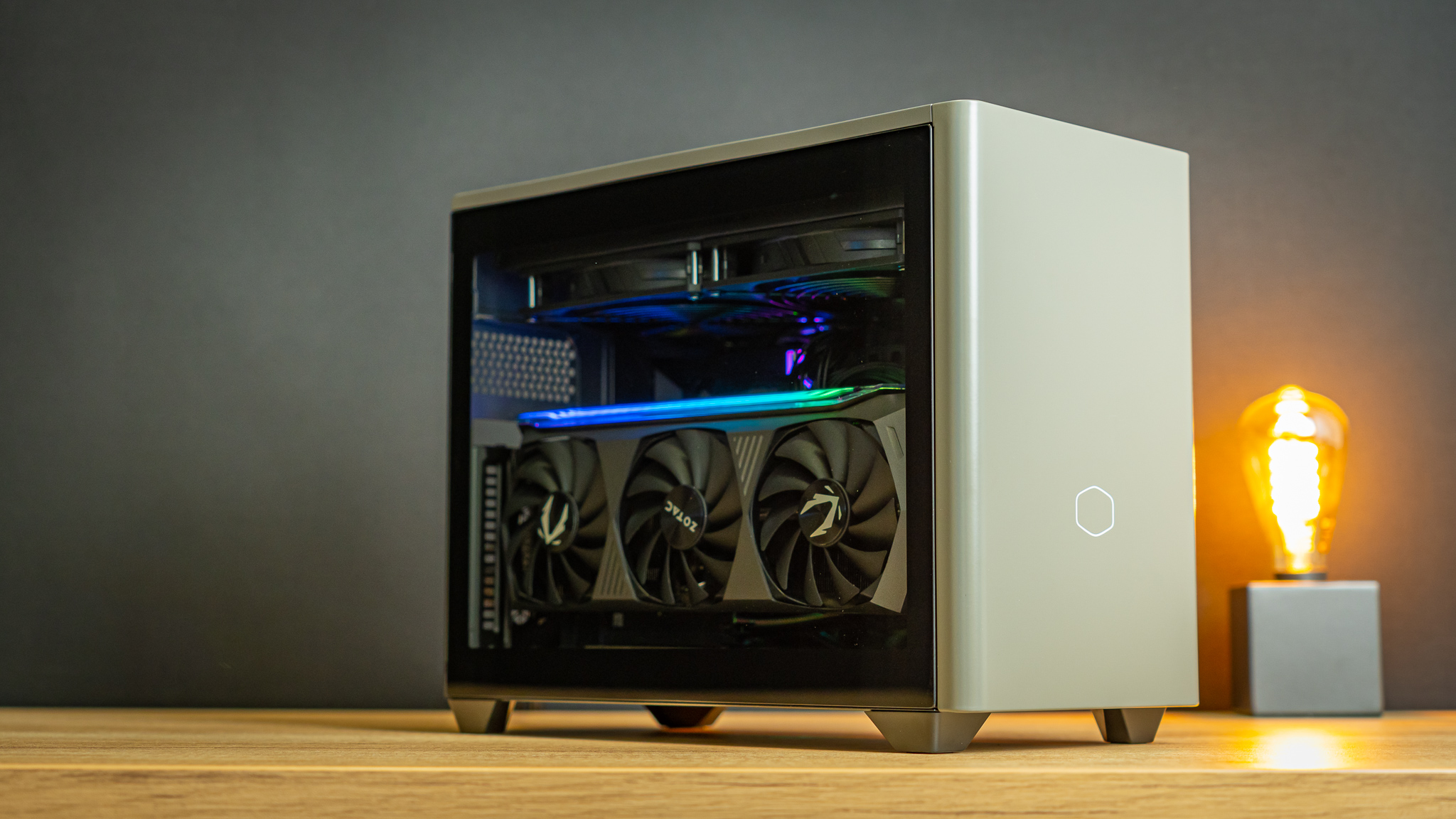
5. Cooler Master NR200P Max
Our expert review:
Specifications
Reasons to buy
Reasons to avoid
Cooler Master’s NR200P Max is an excellent, ready-to-go chassis that comes from the factory with a powerful 850w power supply and 280mm liquid cooler. Top that with the inclusion of both mesh and glass side panels, a PCIe 4.0 riser cable, PSU cables and AIO tubes that are fit to length and pre-routed, and the NR200P Max is extremely simple to build in and an easy recommendation for those looking for simple setup.
All you need to bring is a motherboard, CPU, graphics card, memory, and a boot drive, letting you focus on the important things. The only real catch to this case is that its paint and finish are a bit boring. But with the glass panel showing off your fancy internals, we doubt you’ll mind. And if you do, paint it!
Read: Cooler Master NR200P Max Review
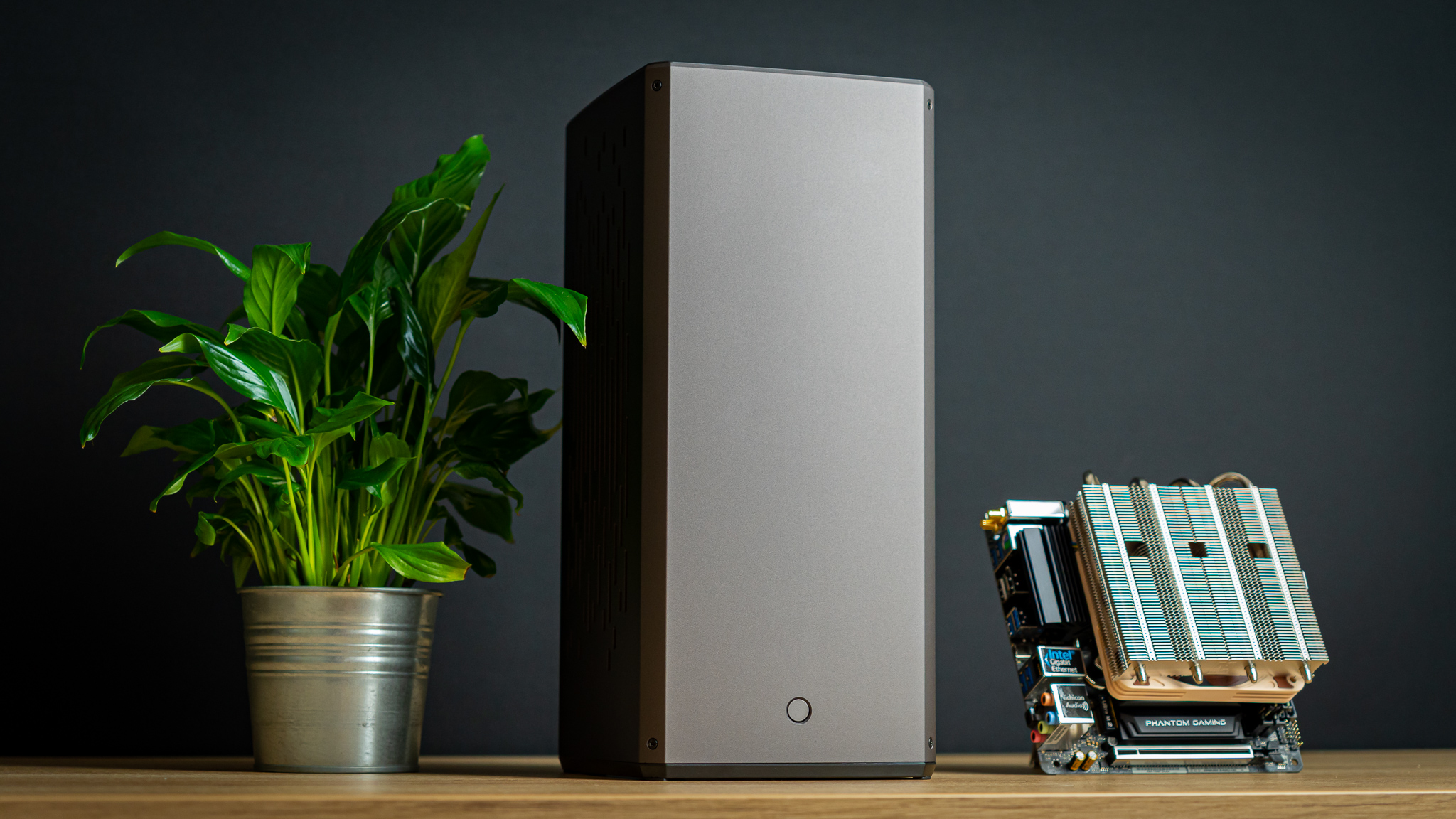
6. Louqe Raw S1
Our expert review:
Specifications
Reasons to buy
Reasons to avoid
It’s been a common complaint that Mini-ITX cases are expensive. And if there’s one chassis that makes this statement true, it is the Louqe Raw S1. But this is a Mini-ITX case to gawk at. From its elegant design to its thick, one-piece aluminum outer shell, the Louqe Raw S1 is more of a work of art than a case.
However, you can fit a PC in here. There’s no AIO support, nor air filtration. So yes, there are sacrifices, but it offers among the easiest build processes – chances are you’ll be done building within the hour and have a very tidy end result. It will also happily fit huge triple-slot graphics cards, despite its ultra-compact 12-litter frame, and with a fancy ‘Cobalt’ PCIe 4.0 riser cable, there’s hardly a thing about this case that isn’t ultra-premium. It even has a carrying handle.
Just keep in mind the case’s $330 price point and limited availability.
Read: Louqe Raw S1 Review
Quick Mini-ITX Case Shopping Tips
- Triple check your parts compatibility: When building in the best Mini-ITX case, compatibility becomes an issue more often than in bigger cases, so you’ll want to spend extra time planning your build around the case. The best strategy is to start with the case you want, and then find parts that fit accordingly.
- Ensure adequate cooling: Especially in small cases, cooling can become an issue due to limited fan and radiator support. If you’re building a mid-range system, this isn’t much of an issue as most cases can deal with that kind of thermal workload. But if you’re building a high-end PC with a high-TDP CPU and GPU (and especially if you’re going to overclock the CPU or GPU), it may be worth looking for a case that supports 240mm or 280m AIOs (we've tested the best AIO coolers here), plus an extra intake fan.
- Double Check PCIe 4.0 Support: Many of the best Mini-ITX cases use PCI-Express riser cables so that the GPU doesn’t have to be slotted directly into the motherboard. But while PCIe 4.0 cables are on the rise, not every Mini-ITX case comes with one. When installing a modern graphics card and a motherboard that has PCIe 4.0 support, it may be worth the extra outlay, especially if you plan on upgrading your GPU again a few years down the road.
- Follow your heart: When it comes down to it, the best Mini-ITX case for your build depends a lot on what you like. Mini-ITX cases come in all sorts of weird and wonderful designs and shapes, so there are plenty of styles to choose from. Take the time to look at all your options and choose one that best fits your needs and aesthetic taste.
Also tested
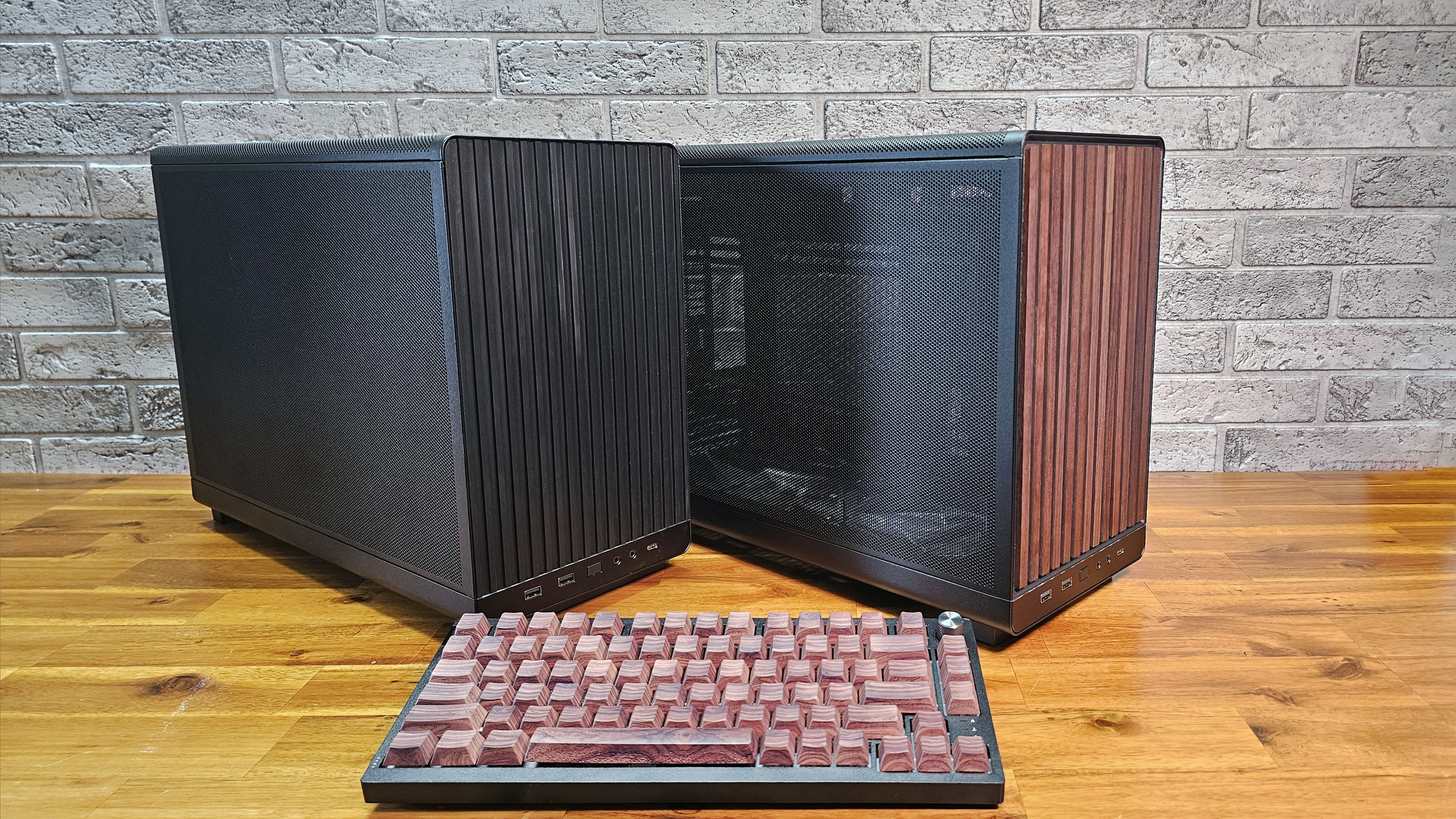
We recently took a look at Lian Li's A3-mATX, a compact and affordable case that starts at just $69 (or $84 for the model with a wood front panel). It supports both Micro ATX and Mini-ITX motherboards, so it's not as small as most of the cases on this list designed solely for ITX boards. But it's well worth considering if you don't quite need the smallest case possible and you are installing a large graphics card -- basically any card should fit in this case, as it has 16.34 inches of of GPU clearance. It also can support a 360mm radiator / AIO up top and full-size power supplies. That said, you might have to go with an SFX model if you are installing a very long graphics card.
Also note that the standard model with the plastic front has no front airflow, while the A3-mATX-WD model has ventilation between its wood slats, backed by a mesh dust filter.
MORE: Best PC Cases
MORE: Best Mini-ITX Cases
Stay On the Cutting Edge: Get the Tom's Hardware Newsletter
Get Tom's Hardware's best news and in-depth reviews, straight to your inbox.
After a rough start with the Mattel Aquarius as a child, Matt built his first PC in the late 1990s and ventured into mild PC modding in the early 2000s. He’s spent the last 15 years covering emerging technology for Smithsonian, Popular Science, and Consumer Reports, while testing components and PCs for Computer Shopper, PCMag and Digital Trends.
-
2Be_or_Not2Be For most getting into the mini-ITX cases, you can't go wrong (and may not go any further) going with the NR200. It's much smaller than the big cases you may have been using, and it's easy to build in. You don't necessarily have to get the Max version if you weren't planning on going with an AIO build. However, if you were, then it doesn't get much easier than the Max with the large 850W PSU and AIO already installed.Reply
The next significant drop in size that I'd recommend is the Ncase M1. It does cost a bit more, but it's an excellent performer that's proven over the test of time. Some of these small sandwich builds can really build the heat on either the GPU or CPU, and some you are forced to use liquid cool. But the Ncase M1 let's you decide how you want to cool it - air or liquid. Great flexiblity, and you even have a Type C port available on the front. Just try to buy a GPU < 300mm in length to install into it. I've even seen 3090 builds in it, so it can definitely be a ton of power in such a small case.
So if you're going into the small cases, enjoy your journey down the rabbit hole! You'll wonder why you ever put up with large towers! -
DataMeister I'm happy to see the Ncase M1 still making it into modern lineups. I have a computer running in the first generation M1 case and I still have trouble finding a better case when looking at doing upgrades.Reply -
TheDane How the SSUPD Meshlicious is not even on the list is beyond me. That is the case to beat if you ask me!Reply -
imsurgical ReplyTheDane said:How the SSUPD Meshlicious is not even on the list is beyond me. That is the case to beat if you ask me!
Late to the party on this one, but would agree the list is pretty solid. I have to completely agree that the Meshlicious has one of the best internal designs, thermals and cutouts of a Mini-ITX case. -
ingtar33 I've been working with various MITX for years so this type of article is good to see from time to time. I currently love my current MITX case though it was a pain to find any reviews for it. Lian Li TU-150WX fantastic mitx case, just a bit rough for the cable management (common in actual MITX cases, it only not an issue on the MATX sized MITX cases.Reply -
Flying-Q I pre-ordered a Q-58 when it was first announced and it arrived on the official release date, some time ago. I have built a fully hard-line, water-cooled system in it with a tiny DDC pump/res from Bykski. 5600X and 3600ti both cooled with a 240 rad.Reply
Contrary with the CONS given in the article, cable management was a doddle, though I did make my own cables to exact length, and the PCIe riser is rock solid without any other support.
I'd show an image, but corporate OneDrive won't allow it to be uploaded. -
paul.r.stone Reply
Only in one picture is it even shown, but yes the M1 is by far what I consider pinnacle SFF and if all they did was add 25mm or so to the depth and width to accommodate newer GPUs and called it M2 I'd buy two of them lolDataMeister said:I'm happy to see the Ncase M1 still making it into modern lineups. I have a computer running in the first generation M1 case and I still have trouble finding a better case when looking at doing upgrades. -
g-unit1111 How did the Dan A4 not make the list? You can fit a full size GPU and a 240mm cooler in the rig and everything fits beautifully. Not to mention there's a ton of readily available customizations and mods for it, for those who are into that sort of thing. I just built a new rig in this case and I am very pleased with the result.Reply -
greenreaper I built my latest box with the InWin Chopin Max, which supports zero GPU cards - what it's designed for is use with an APU (or anything with integrated graphics in general, which includes almost all of the Ryzen 7000-series as well as Intel's latest). Cooling my 7600 worked well enough with the box fan, but even better with a Noctua NH-L9a-AM5 and the NA-FD1 duct to reach the mesh top - add 64GB DDR5 and it's well within the included 200W Gold PSU.Reply -
usertests Reply
I'll probably go for something like that in the future. Once desktop APUs arrive on AM5, there will be a lot more interest in APU-only builds, and possibly more cases made for it.greenreaper said:I built my latest box with the InWin Chopin Max, which supports zero GPU cards - what it's designed for is use with an APU (or anything with integrated graphics in general, which includes almost all of the Ryzen 7000-series as well as Intel's latest). Cooling my 7600 worked well enough with the box fan, but even better with a Noctua NH-L9a-AM5 and the NA-FD1 duct to reach the mesh top - add 64GB DDR5 and it's well within the included 200W Gold PSU.
One concern I heard is that the Chopin Max PSU is proprietary.
